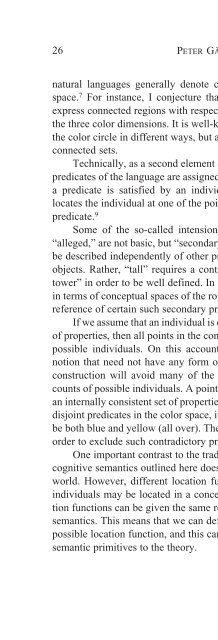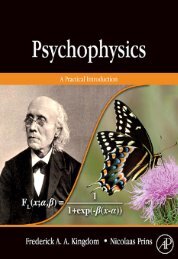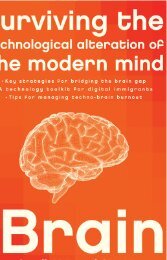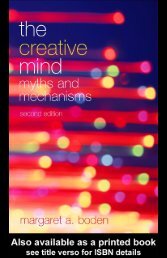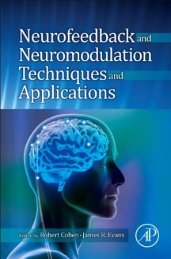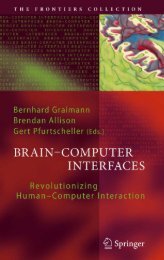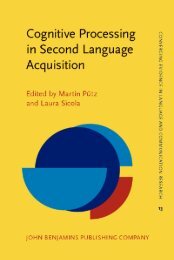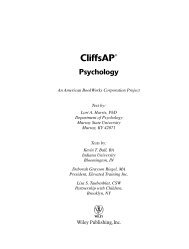Cognitive Semantics : Meaning and Cognition
Cognitive Semantics : Meaning and Cognition
Cognitive Semantics : Meaning and Cognition
You also want an ePaper? Increase the reach of your titles
YUMPU automatically turns print PDFs into web optimized ePapers that Google loves.
FUNCTION, COGNITION, AND LAYERED CLAUSE STRUCTURE 61<br />
flies works by inserting “time” in an agent slot, just as gladly turns into a<br />
commitment to perform an action because it is inserted into a slot where the<br />
alternative is acceptance or rejection.<br />
10. Two possible ways of keeping language purely cognitive<br />
There are two ways in which the theory that meaning is entirely distinct from<br />
communication might be upheld even in agreement with the basic picture I<br />
have outlined. First of all, it would be compatible with the evolutionary<br />
scenario to have a language with purely conceptual, de-contextualized meaning<br />
— provided that all the work of plugging meaning into the context was left<br />
to the inferential abilities of the speaker.<br />
This would imply that function was not coded in human language at all,<br />
but left solely to inferential, pragmatic interpretation — or, alternatively, left<br />
to the paralinguistic system that we have essentially inherited from the apes.<br />
Language would then feed descriptive, conceptual meaning into the situation<br />
without any indication of how it was to be related to the situation. This view is<br />
extremely resilient: the distinction between “illocutionary” <strong>and</strong> “locutionary”<br />
act in Austin preserves more or less the same dichotomy between coded<br />
description <strong>and</strong> pragmatic function, with the performative verbs as the privileged<br />
exception; <strong>and</strong> it is still customary to speak of “pragmatic” as opposed to<br />
“semantic” types of meaning, even in cases where the so-called pragmatic<br />
type of meaning is clearly coded, cf., e.g., the notion of “pragmatic particles”.<br />
There is a (deceptive) plausibility about this picture which is due to the<br />
fact that the functional, situational types of meaning are by their nature the<br />
most easily inferable. It is not typical to be able to guess the conceptual<br />
concept of the next utterance — but the nature of the situation may constrain<br />
its situational function considerably. This means that if a clever addressee gets<br />
the right content words, he can do the job of organizing them <strong>and</strong> assigning a<br />
situational function to them on his own. This is why Schank on behalf of the<br />
AI community can say that he can do virtually without syntax, managing<br />
everything by inference schemas. That this is communicatively feasible even<br />
with a limited vocabulary is exemplified by the tourist situation. And some<br />
languages do not code deictic tense, or definite articles.<br />
In spite of all this, the human language prototype does not leave all<br />
functional organization either to paralinguistic signals or to the unaided infer-


